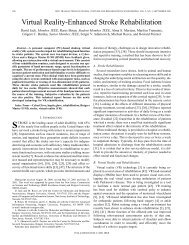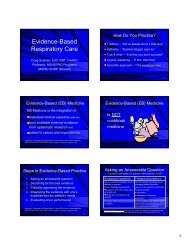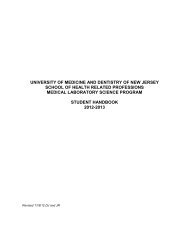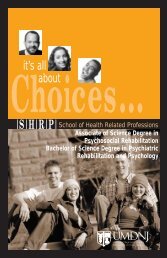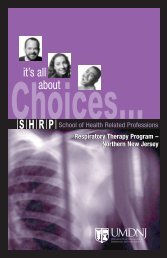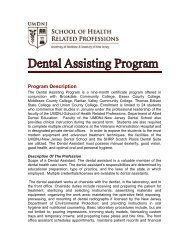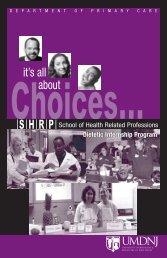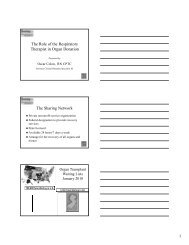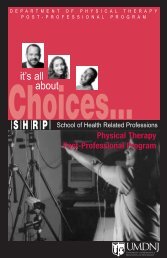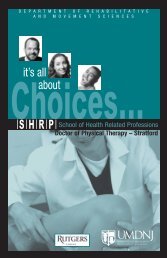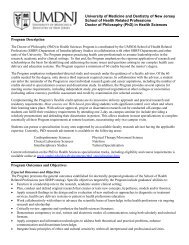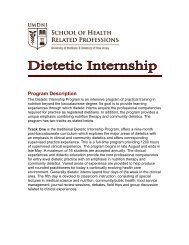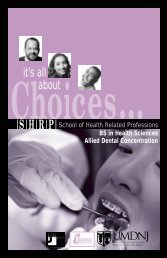clinical nutrition grad - School of Health Related Professions
clinical nutrition grad - School of Health Related Professions
clinical nutrition grad - School of Health Related Professions
You also want an ePaper? Increase the reach of your titles
YUMPU automatically turns print PDFs into web optimized ePapers that Google loves.
D E P A R T M E N T O F<br />
N U T R I T I O N A L S C I E N C E S<br />
it’s all<br />
about<br />
Choices…<br />
<strong>School</strong> <strong>of</strong> <strong>Health</strong> <strong>Related</strong> Pr<strong>of</strong>essions<br />
S H R P<br />
Graduate Programs in<br />
Clinical Nutrition
Choices…<br />
Students who choose<br />
UMDNJ's <strong>School</strong><br />
<strong>of</strong> <strong>Health</strong> <strong>Related</strong><br />
Pr<strong>of</strong>essions want<br />
a University that is<br />
exclusively dedicated<br />
to healthcare, with<br />
state-<strong>of</strong>-the-art<br />
equipment, rigorous<br />
coursework, and faculty<br />
who care. All <strong>of</strong> our<br />
resources go toward<br />
supporting a healthcare<br />
educational environment<br />
that attracts and nurtures<br />
the very best<br />
faculty and students.<br />
-2-
GRADUATE PROGRAMS IN CLINICAL NUTRITION<br />
Table <strong>of</strong> Contents<br />
Graduate Programs in Clinical Nutrition . . . . . . . . . . . . . . . . . . . .4<br />
Strategic Vision . . . . . . . . . . . . . . . . . . . . . . . . . . . . . . . . . . . .5<br />
Master <strong>of</strong> Science in Clinical Nutrition<br />
Missions, Goals and Competencies . . . . . . . . . . . . . . . . . . . . .6<br />
Requirements for Admission . . . . . . . . . . . . . . . . . . . . . . . . . .7<br />
Requirements for Graduation . . . . . . . . . . . . . . . . . . . . . . . . .7<br />
Doctorate in Clinical Nutrition<br />
Mission, Goals, and Competencies . . . . . . . . . . . . . . . . . . . . .8<br />
Requirements for Admission . . . . . . . . . . . . . . . . . . . . . . . . . .9<br />
Requirements for Graduation . . . . . . . . . . . . . . . . . . . . . . . . .10<br />
Elective Courses . . . . . . . . . . . . . . . . . . . . . . . . . . . . . . . . . . . . . . .11<br />
Graduate Program Course Descriptions . . . . . . . . . . . . . . . . . . . .12<br />
Application Information . . . . . . . . . . . . . . . . . . . . . . . . . . . . . . . .18<br />
Non-Matriculated Status . . . . . . . . . . . . . . . . . . . . . . . . . . . . . . . .18<br />
Continuing Pr<strong>of</strong>essional Education Option . . . . . . . . . . . . . . . . . .18<br />
Financial Aid . . . . . . . . . . . . . . . . . . . . . . . . . . . . . . . . . . . . . . . . .18<br />
Program Faculty . . . . . . . . . . . . . . . . . . . . . . . . . . . . . . . . . . . . . .19<br />
SHRP Mission Statement . . . . . . . . . . . . . . . . . . . . . . . . . . . . . . . .20<br />
UMDNJ Mission Statement . . . . . . . . . . . . . . . . . . . . . . . . . . . . . .20<br />
-3-
GRADUATE PROGRAMS IN CLINICAL NUTRITION<br />
DEPARTMENT OF NUTRITIONAL SCIENCES<br />
The University <strong>of</strong> Medicine and Dentistry <strong>of</strong> New Jersey (UMDNJ) - <strong>School</strong> <strong>of</strong> <strong>Health</strong><br />
<strong>Related</strong> Pr<strong>of</strong>essions (SHRP) supports the philosophy that learning is life-long; dietetics<br />
programs are <strong>of</strong>fered on the prepr<strong>of</strong>essional, master’s and doctoral levels.<br />
Individuals may also take academic courses for continuing pr<strong>of</strong>essional education<br />
credit.<br />
In 1995, SHRP introduced the first master’s level program in New Jersey designed<br />
exclusively for Registered Dietitians (RDs). This web-based Master <strong>of</strong> Science in<br />
Clinical Nutrition (MSCN) program provides a <strong>clinical</strong>ly challenging and rigorous<br />
<strong>grad</strong>uate education in <strong>nutrition</strong>. The program is unique in regards to its distance education<br />
options and for advanced-level practice opportunities in <strong>clinical</strong>, community,<br />
public health and management settings.<br />
In 2000, the Ph.D. in <strong>Health</strong> Sciences-Nutrition Track opened. This web-based doctor<br />
<strong>of</strong> philosophy program provides an academically challenging and rigorous doctoral<br />
education in research with a focus on <strong>nutrition</strong>. The program serves to prepare<br />
RDs for assuming leadership roles in research, academic, and/or <strong>clinical</strong> settings.<br />
In 2003, SHRP opened the first <strong>clinical</strong> doctorate program in <strong>nutrition</strong> (DCN). This<br />
web-based program focuses on expert <strong>clinical</strong> practice assuring that RDs remain integral<br />
members <strong>of</strong> the health care team. The program requires completion <strong>of</strong> a <strong>clinical</strong><br />
doctorate residency and an outcomes research project.<br />
In addition to the advanced-level MSCN, DCN, and Ph.D. degree options, SHRP has<br />
been a long time leader in dietetic education. The Dietetic Internship (DI) has been<br />
preparing dietetics pr<strong>of</strong>essionals for entry-level practice since 1973. In 1998, a<br />
Coordinated Program (CP) for Dietetic Technicians, Registered (DTRs) wishing to<br />
pursue dietetic registration eligibility was added.<br />
This brochure addresses the Master <strong>of</strong> Science in Clinical Nutrition and the Doctorate<br />
in Clinical Nutrition programs. Additional information about any <strong>of</strong> the aforementioned<br />
programs can be accessed by visiting the SHRP website:<br />
http://shrp.umdnj.edu/.<br />
-4-
GRADUATE PROGRAMS IN CLINICAL NUTRITION<br />
Strategic Vision:<br />
The Master <strong>of</strong> Science in Clinical Nutrition (MSCN) and the Doctorate in Clinical<br />
Nutrition (DCN) Programs are models for advanced-level <strong>grad</strong>uate study in <strong>clinical</strong><br />
<strong>nutrition</strong>. The programs utilize a web-based platform to educate a diverse group <strong>of</strong><br />
RD pr<strong>of</strong>essionals to service the state, nation and communities abroad. Graduates are<br />
prepared with critical thinking and scientific skills needed for advanced-level <strong>clinical</strong><br />
practice, management, research, and leadership roles to respond to the challenges <strong>of</strong><br />
the 21st century. Graduates are consumers <strong>of</strong> research and scholarship, able to<br />
design, conduct, analyze and publish scientifically sound research and other peer<br />
reviewed papers on evidence-based dietetics practice. The program instills an appreciation<br />
for interdisciplinary collaboration and education, provides “upskilling”<br />
opportunities to achieve expanded roles in health promotion, disease prevention and<br />
intervention for a multi-cultural society.<br />
-5-
MASTER OF SCIENCE IN CLINICAL NUTRITION<br />
MSCN Mission Statement:<br />
The MSCN is dedicated to the pursuit <strong>of</strong> excellence through an individualized<br />
advanced-level, <strong>clinical</strong>ly focused <strong>grad</strong>uate degree program. The program instills an<br />
appreciation <strong>of</strong> lifelong learning, pr<strong>of</strong>essional leadership and service. It prepares<br />
<strong>grad</strong>uates with the advanced knowledge, expanded skills, and intellectual maturity<br />
necessary to become progressive, innovative and interpr<strong>of</strong>essional practitioners and<br />
leaders in the dynamic health care environment.<br />
MSCN Goal Statements<br />
The MSCN:<br />
1. Advances knowledge and expands skills necessary to execute the role <strong>of</strong> innovative<br />
and progressive dietetics practitioners;<br />
2. Provides an outcome oriented, student centered approach to <strong>grad</strong>uate education;<br />
3. Promotes collaboration and interdisciplinary education through advanced level<br />
courses;<br />
4. Promotes the design, conduct, and analysis <strong>of</strong> <strong>clinical</strong> <strong>nutrition</strong>/dietetics research;<br />
5. Advocates pr<strong>of</strong>essional leadership and service.<br />
MSCN Competencies<br />
Upon the completion <strong>of</strong> the program, <strong>grad</strong>uates will be prepared to:<br />
11. Provide medical <strong>nutrition</strong> therapy utilizing the Nutrition Care Process model<br />
inclusive <strong>of</strong> standardized language for <strong>nutrition</strong> diagnosing, assessment, care<br />
planning and monitoring <strong>of</strong> medically complex patients with acute, chronic, and<br />
terminal illnesses.<br />
12. Collaborate with health care team members in the interdisciplinary management<br />
<strong>of</strong> specialized <strong>nutrition</strong> modalities, conditions, and illnesses.<br />
13. Establish <strong>nutrition</strong> practices for health promotion, disease prevention and management<br />
independently or in collaboration with health care provider organizations.<br />
14. Design and conduct dietetics/<strong>nutrition</strong> research in a variety <strong>of</strong> settings.<br />
15. Become intelligent, critical consumers <strong>of</strong> research and scholarly work, able to<br />
incorporate the current scientific knowledge and emerging trends in science into<br />
practice.<br />
16. Utilize effective management, leadership, and information technology skills to<br />
guide dietetics practice into the future.<br />
17. Interpret and apply evidence-based research literature in <strong>clinical</strong> practice.<br />
18. Design, implement, and evaluate health and medical <strong>nutrition</strong> therapy interventions<br />
in a multi-cultural society.<br />
19. Assume roles as competent ‘upskilled’ practitioners.<br />
10. Become life-long learners, using self-assessment and continuing education to persistently<br />
advance individual knowledge and skills.<br />
11. Comply with the Code <strong>of</strong> Ethics <strong>of</strong> the American Dietetic Association and display<br />
ethical behavior in practice, education, and scholarly activities.<br />
-6-
Requirements for Admission into the MSCN Program:<br />
Prospective students must be RDs. Application materials include the SHRP application<br />
available at http://shrp.umdnj.edu/, an <strong>of</strong>ficial copy <strong>of</strong> the transcript for the highest<br />
<strong>nutrition</strong> degree earned, a notarized copy <strong>of</strong> RD card, a resume, and a letter stating<br />
short and long term goals for completing the MSCN Program. All applicants that<br />
meet the admission criteria will be scheduled for an interview with select faculty in the<br />
UMDNJ Graduate Programs in Clinical Nutrition. Students may apply for admission<br />
to the fall or spring semesters. Refer to http://shrp.umdnj.edu for deadlines.<br />
Graduates <strong>of</strong> the UMDNJ - SHRP Dietetic Internship and Coordinated Program who<br />
maintained a 3.2 GPA in the internship are accepted into the program if they complete<br />
all application procedures. Six elective credits from their <strong>grad</strong>uate internship<br />
course work may be transferred when the MSCN is started within five years <strong>of</strong> <strong>grad</strong>uation<br />
from the Dietetic Internship. These <strong>grad</strong>uates must submit all application<br />
materials except under<strong>grad</strong>uate transcripts. A letter must be included with the application<br />
materials stating the <strong>grad</strong>uation date from UMDNJ.<br />
The MSCN program provides advanced-level <strong>nutrition</strong> education for other health<br />
pr<strong>of</strong>essionals including physicians, physician assistants, dentists, and other allied<br />
health pr<strong>of</strong>essionals on a non-matriculated basis.<br />
Program <strong>of</strong> Study & Graduation Requirements:<br />
The MSCN can be completed online on a part or full time basis. Students are<br />
required to come to campus in New Jersey a minimum <strong>of</strong> two times during their<br />
coursework. Successful completion <strong>of</strong> the following courses, totaling 31 credits, is<br />
required for <strong>grad</strong>uation. For the current semester schedule visit<br />
http://shrp.umdnj.edu/nutr.<br />
MSCN Course Requirements for Graduation<br />
NUTR 6380 Thesis Seminar 3 credits<br />
NUTR 6400 Clinical Management 3 credits<br />
NUTR 6480 Applied Clinical Research 4 credits<br />
NUTR 6601 Advanced Clinical Nutrition 3 credits<br />
NUTR 6609 Subspecialty Clinical Practice 3 credits<br />
<strong>Health</strong> Sciences<br />
Electives<br />
6 credits<br />
9 credits<br />
31 credits<br />
<strong>Health</strong> Sciences may include: Pathophysiology (NURS 5104), Applied Physiology<br />
(NUTR 6260), Nutrition and Exercise Physiology (NUTR 6270), Vitamin and<br />
Mineral Metabolism (NUTR 6300), Nutrition and Pharmacology (NUTR 7510),<br />
Human Metabolism and Body Composition (NUTR 7210), <strong>grad</strong>uate level biochemistry,<br />
or other sciences as approved by faculty advisor. For a list <strong>of</strong> elective courses, see<br />
page 11 <strong>of</strong> this brochure.<br />
-7-
DOCTORATE IN CLINICAL<br />
NUTRITION<br />
DCN Mission Statement<br />
The Doctorate <strong>of</strong> Clinical Nutrition (DCN) is dedicated to the pursuit <strong>of</strong> excellence<br />
through a <strong>clinical</strong>ly focused dietetics practice doctorate program. It prepares <strong>grad</strong>uates<br />
with expert-level knowledge and skills, critical thinking pr<strong>of</strong>iciency, and aptitude<br />
in scientific inquiry to foster the development <strong>of</strong> innovative, autonomous advanced<br />
dietetics practitioners and researchers. The program emphasizes interpr<strong>of</strong>essional<br />
collaboration through coursework and a student focused <strong>clinical</strong> residency. The curriculum<br />
integrates evidence-based practice in <strong>nutrition</strong> and dietetics which provides<br />
the foundation for <strong>grad</strong>uates to complete an outcomes research project.<br />
DCN Goal Statements<br />
The DCN:<br />
1. Provides an in-depth study <strong>of</strong> <strong>clinical</strong> <strong>nutrition</strong> and evidence based practice through<br />
cutting-edge coursework and a <strong>clinical</strong> practice residency to prepare <strong>grad</strong>uates to<br />
assume the role <strong>of</strong> an advanced-level dietetics practitioner.<br />
2. Prepares <strong>grad</strong>uates to be able to design, conduct, and analyze <strong>clinical</strong> outcomes<br />
research in diverse settings.<br />
3. Develops experts in evidence-based <strong>nutrition</strong> practice using <strong>clinical</strong> reasoning and<br />
scientific inquiry.<br />
4. Fosters pr<strong>of</strong>essional leadership, service, and scholarly efforts.<br />
DCN Competencies<br />
Upon completion <strong>of</strong> the program, <strong>grad</strong>uates will be prepared to:<br />
Practice:<br />
1. Practice as an advanced dietetics practitioner for individuals, communities, and/or<br />
<strong>clinical</strong> populations with expert-level competency in assessment, diagnosis, implementation<br />
and evaluation <strong>of</strong> <strong>clinical</strong> <strong>nutrition</strong> care plans using the Nutrition Care<br />
Process model, standardized language, and evidence-based practice guidelines.<br />
2. Conduct a comprehensive <strong>nutrition</strong>-focused physical assessment and interpret<br />
results relative to <strong>nutrition</strong>al well-being using <strong>nutrition</strong>al diagnostic reasoning and<br />
standardized language.<br />
3. Incorporate knowledge <strong>of</strong> body composition and <strong>nutrition</strong>al physiology to guide<br />
<strong>clinical</strong> decision making in the assessment <strong>of</strong> healthy and medically complex<br />
patients with acute, chronic and terminal illnesses.<br />
4. Assimilate knowledge <strong>of</strong> drug-nutrient, and drug-dietary supplement interactions<br />
and associated pharmokinetics and pharmacodynamics in patient care.<br />
5. Apply a global perspective to pr<strong>of</strong>essional practice by incorporating scientific, <strong>clinical</strong><br />
and cultural implications <strong>of</strong> food and <strong>nutrition</strong> into <strong>clinical</strong> practice.<br />
-8-
16. Apply critical thinking skills in communication, information management, problem<br />
solving and resource utilization to foster pr<strong>of</strong>essional autonomy in <strong>clinical</strong><br />
practice.<br />
17. Collaborate with other members <strong>of</strong> the healthcare team, industry and academia<br />
as the <strong>nutrition</strong> expert.<br />
18. Mentor and teach <strong>clinical</strong> <strong>nutrition</strong> practice to students and colleagues across<br />
diverse health care arenas.<br />
19. Analyze current <strong>nutrition</strong>al interventions using an evidence-based approach.<br />
10. Become life-long learners, using self-assessment and continuing education to continuously<br />
advance individual knowledge and skills.<br />
11. Comply with the Code <strong>of</strong> Ethics <strong>of</strong> the American Dietetic Association and display<br />
ethical behavior in practice, education, and scholarly activities.<br />
Research:<br />
1. Demonstrate competence in the interpretation and critique <strong>of</strong> scientific healthcare<br />
literature using an evidence analysis approach; apply and integrate findings into<br />
practice settings.<br />
2. Design, conduct, analyze, and author papers on <strong>clinical</strong> <strong>nutrition</strong> outcomes<br />
research.<br />
3. Present and defend research findings to pr<strong>of</strong>essional audiences and develop a manuscript<br />
worthy <strong>of</strong> publication to a peer reviewed journal.<br />
Requirements for Admission into the Doctorate <strong>of</strong> Clinical Nutrition<br />
Applicants must have the RD credential, a master’s degree, preferably in <strong>nutrition</strong> or<br />
a health related field (with a minimum GPA <strong>of</strong> 3.4) and have at least three years <strong>of</strong><br />
pr<strong>of</strong>essional experience as a <strong>clinical</strong> RD. All applicants that meet the admission criteria<br />
will be scheduled for an interview with select faculty in the UMDNJ Graduate<br />
Programs in Clinical Nutrition.<br />
Application materials for submission include a SHRP application available at<br />
http://shrp.umdnj.edu/, a letter stating short and long term goals for completing the<br />
DCN, a notarized copy <strong>of</strong> RD card, a resume, and transcripts from the highest degree<br />
earned. If the highest degree is not in <strong>nutrition</strong>, the transcripts from the <strong>nutrition</strong><br />
degree must be included. Applicants who are foreign-trained must take the Test <strong>of</strong><br />
English as a Foreign Language (TOEFL) and must submit an <strong>of</strong>ficial copy <strong>of</strong> a transcript<br />
evaluation prepared by a recognized transcript evaluation agency such as:<br />
World Education Services Inc., PO Box 5087, Bowling Green Station, New York, NY,<br />
10274-5087, http://www.wes.org/ ; or similar transcript evaluation service. Foreigntrained<br />
applicants who have completed a master’s degree in the U.S. are eligible for a<br />
waiver from this requirement.<br />
-9-
Program <strong>of</strong> Study & Graduation Requirements<br />
The 51-credit program taken on a part-time basis (9 to 15 credits per year) generally<br />
takes approximately four to five years to complete, depending on semester credit<br />
loads. UMDNJ-SHRP <strong>grad</strong>uates <strong>of</strong> the MSCN program who enter the DCN within<br />
five years <strong>of</strong> <strong>grad</strong>uation from the MSCN may be eligible to receive credit for courses<br />
taken in the MSCN program that are part <strong>of</strong> the DCN curriculum. Individuals with<br />
another master’s degree or prior master’s level coursework completed within the past<br />
five years may request a review <strong>of</strong> courses for credit. Portfolio assessment credit may<br />
be applied and granted for pr<strong>of</strong>essional experience if it coincides with the content <strong>of</strong><br />
one or more <strong>of</strong> the DCN courses.<br />
Once students have successfully defended their pilot research in NUTR 6380 and all<br />
other coursework, they can enroll in NUTR 7009 Clinical Practice Residency and<br />
NUTR 7481 Clinical Nutrition Research Methods. Students are required to come to<br />
campus in New Jersey a minimum <strong>of</strong> three times over the course <strong>of</strong> their study.<br />
Students must maintain a GPA <strong>of</strong> 3.0 (‘B’ or higher) throughout the program.<br />
Students whose performance in the <strong>clinical</strong> practice residency falls below a ‘B’ <strong>grad</strong>e<br />
may be scheduled for additional residency time to successfully meet the program<br />
competencies. Successful completion <strong>of</strong> the following courses, totaling 51 credits is<br />
required for <strong>grad</strong>uation. For current semester schedule visit: http://shrp.umdnj.edu/nutr.<br />
DCN Course Requirements for Graduation<br />
NUTR 6260 Applied Physiology 3 credits<br />
NUTR 6300 Vitamin and Mineral Metabolism 3 credits<br />
NUTR 6380 Thesis Seminar 3 credits<br />
NUTR 6400 Clinical Management 3 credits<br />
NUTR 6480 Applied Clinical Research 4 credits<br />
NUTR 6601 Advanced Clinical Nutrition 3 credits<br />
NUTR 7009 Clinical Practice Residency 5 credits<br />
NUTR 7210 Human Metabolism & Body Composition 3 credits<br />
NUTR 7320 Advanced Clinical Nutrition Seminar 3 credits<br />
NUTR 7481 Clinical Nutrition Research Methods 3 credits<br />
NUTR 7482 Clinical Research Seminar 3 credits<br />
NUTR 7510 Nutrition and Pharmacology 3 credits<br />
PCAR 7115 Complementary & Alternative Medicine Seminar 3 credits<br />
Electives<br />
9 credits<br />
51 credits<br />
For a list <strong>of</strong> elective courses, see page 11 <strong>of</strong> this brochure.<br />
-10-
ELECTIVE COURSES<br />
All courses are 3 <strong>grad</strong>uate credits unless otherwise indicated.*<br />
Course Title<br />
Course Number<br />
Independent Study (1 to 3 credits) NUTR 6000<br />
Lactation Education NUTR 6120<br />
Applied Physiology NUTR 6260<br />
Nutrition & Exercise Physiology NUTR 6270<br />
Pediatric Nutrition NUTR 6310<br />
Nutrition and Aging NUTR 6420<br />
Nutrition Assessment <strong>of</strong> the Older Adult NUTR 6440<br />
Cultural Issues Influencing <strong>Health</strong> NUTR 6500<br />
Ethical Issues in <strong>Health</strong> Care Practice NUTR 6505<br />
Current Nutrition Issues in <strong>Health</strong> Care NUTR 6510<br />
Nutritional Genomics for Practitioners NUTR 6820<br />
Current Issues in Nutrition NUTR 7110<br />
Human Metabolism and Body Composition NUTR 7210<br />
Nutrition and Behavior Management NUTR 7512<br />
Advanced Technological Applications in Dietetics NUTR 7310<br />
Advanced Clinical Nutrition Seminar NUTR 7320<br />
Nutrition and Pharmacology NUTR 7510<br />
Women’s <strong>Health</strong> PCAR 7410<br />
Complementary & Alternative Medicine Seminar PCAR 7115<br />
Pathophysiology NURS 5104<br />
Information Mgmt & Communication Technologies IDST 5000<br />
Multidisciplinary Dimensions <strong>of</strong> Clinical Systems Mgmt. IDST 5100<br />
<strong>Health</strong> Services Issues & Trends IDST 5110<br />
Teaching in the <strong>Health</strong> Pr<strong>of</strong>essions IDST 5140<br />
Curriculum Development in <strong>Health</strong> Pr<strong>of</strong>essions Education IDST 5210<br />
Management and Leadership in <strong>Health</strong> Pr<strong>of</strong>essions Education IDST 5240<br />
Managing Disease in Older Adults IDST 5310<br />
Social and <strong>Health</strong> Care Policy for Older Adults IDST 5320<br />
Approaches to the Older Adult IDST 5330<br />
Strategic Planning and the Management <strong>of</strong> <strong>Health</strong> Systems IDST 6110<br />
Evidence Based Literature Review IDST 6400<br />
<strong>Health</strong> Care Information Systems BINF 5005<br />
Clinical Problem Solving and Decision Making BINF 5125<br />
Interactive Learning Systems for <strong>Health</strong> Sciences BINF 5312<br />
Clinical Information Systems Design BINF 5403<br />
*Note: 7000 level courses are for students in the DCN or Ph.D. programs. Master’s<br />
level students may enroll in these courses with permission from their advisor and the<br />
course director.<br />
Course Codes:<br />
BINF: SHRP Department <strong>of</strong> <strong>Health</strong> Informatics<br />
IDST: SHRP Department <strong>of</strong> Interdisciplinary Studies<br />
NUTR: SHRP Department <strong>of</strong> Nutritional Sciences<br />
NURS: <strong>School</strong> <strong>of</strong> Nursing<br />
PCAR: SHRP Department <strong>of</strong> Primary Care<br />
-11-
COURSE DESCRIPTIONS<br />
All courses are 3 credits and web-based unless otherwise noted.<br />
NUTR 6000 Independent Study (1, 2 or 3 credits)<br />
Opportunities for directed inquiry into a problem or population <strong>of</strong> practical or theoretical<br />
importance to dietetic practice are available. Experiences may include serving<br />
as a research or teaching assistant or developing a project.<br />
NUTR 6120 Lactation Education<br />
Didactic and simulated <strong>clinical</strong> case-based learning via an interdisciplinary approach<br />
to breastfeeding education and promotion. The physiological, psychosocial, immunologic<br />
and economic benefits <strong>of</strong> breastfeeding to the infant and mother are covered in<br />
the course. Strategies for breastfeeding education during pregnancy, infancy and<br />
beyond infancy are addressed in normal and medically challenged situations.<br />
NUTR 6260 Applied Physiology (includes 3-day in-person workshop)<br />
This course provides an introduction to physical and diagnostic assessment <strong>of</strong> health<br />
status. Physical assessment competencies to be attained at the novice level include:<br />
assessment <strong>of</strong> body composition, measurement <strong>of</strong> vital signs, physical assessment <strong>of</strong><br />
fluid status, assessment <strong>of</strong> ‘normal’ breath and heart sounds, intra- and extra-oral<br />
assessment, dysphagia screening, and <strong>clinical</strong> assessment <strong>of</strong> <strong>nutrition</strong> status. The inperson<br />
workshop includes discussion and demonstration <strong>of</strong> techniques and practice<br />
under expert supervision.<br />
NUTR 6270 Nutrition and Exercise Physiology<br />
This seminar focuses on the interaction between diet/<strong>nutrition</strong> and exercise in health<br />
promotion, weight control and management <strong>of</strong> chronic disease. The synergistic relationship<br />
between exercise and diet management <strong>of</strong> clients with weight management<br />
problems and chronic diseases is explored through online seminars and case discussions.<br />
<strong>Health</strong> promotion guidelines for diet and exercise are addressed. Exercise and<br />
diet/<strong>nutrition</strong> guidelines for client assessment, education and monitoring are<br />
addressed.<br />
NUTR 6300 Vitamin and Mineral Metabolism<br />
Theories and principles <strong>of</strong> vitamin and mineral metabolism combined with their<br />
application in <strong>clinical</strong> care and health promotion. Vitamins, minerals, and other natural<br />
and synthetic elements, with known or postulated nutrient effects, are explored<br />
in a combined lecture and seminar course. Effects <strong>of</strong> food technology on nutrient<br />
availability and longevity in the food supply, ‘nutraceuticals’ and federal policy and<br />
agencies governing vitamin and minerals are included. The first half <strong>of</strong> the course,<br />
taught by vitamin and mineral researchers, focuses on nutrient metabolism, function,<br />
and requirements throughout the lifespan and the multiple factors affecting needs and<br />
availability in health and disease. The second half <strong>of</strong> the course is seminar based and<br />
links the biochemistry <strong>of</strong> vitamins and minerals to <strong>clinical</strong> practice and consumer use.<br />
-12-
NUTR 6310 Pediatric Nutrition<br />
Advanced study <strong>of</strong> <strong>nutrition</strong> and diet in the neonate, infant, and child. The course<br />
focuses on the interrelationships <strong>of</strong> growth and development <strong>of</strong> the infant/child with<br />
<strong>nutrition</strong> status in health and disease. Nutrition for health promotion, the effects <strong>of</strong><br />
mal<strong>nutrition</strong>, disease and demographics on <strong>nutrition</strong> status, nutrient needs, feeding<br />
strategies, and normal growth and development are covered including pathophysiology<br />
<strong>of</strong> growth and development and their effect on organ systems. Nutrition assessment,<br />
planning, monitoring, counseling, and evaluation strategies are covered<br />
through lectures, literature reviews and case applications. Effects <strong>of</strong> medications, congenital<br />
and acquired diseases, treatments and the physical environment are included.<br />
The unique needs <strong>of</strong> this population for initial and ongoing counseling and monitoring<br />
are covered in discussions <strong>of</strong> psychological, ethical and social dynamics <strong>of</strong> care.<br />
NUTR 6380 Thesis Seminar<br />
The focus <strong>of</strong> the seminar course is completion <strong>of</strong> data analysis, evaluation, interpretation<br />
and preparation and presentation <strong>of</strong> the research thesis. (Prerequisite NUTR<br />
6480).<br />
NUTR 6400 Clinical Management<br />
Application <strong>of</strong> the principles <strong>of</strong> management and <strong>clinical</strong> <strong>nutrition</strong> in the administration<br />
<strong>of</strong> <strong>nutrition</strong> services in various settings: acute and long-term care, ambulatory<br />
care and consultant services. Theories, techniques and tools drawn from current literature<br />
in business, management, health care and dietetics along with innovative practices<br />
are applied to <strong>nutrition</strong> management. Foundations <strong>of</strong> management, standards<br />
<strong>of</strong> practice, organizational design, and policies and procedures are used to teach<br />
development <strong>of</strong> a management framework in the <strong>clinical</strong> setting. Other topics include<br />
strategic planning, financial and human management, leadership styles, meetings,<br />
mentoring and task delegation.<br />
NUTR 6420 Nutrition and Aging<br />
Advanced study <strong>of</strong> <strong>nutrition</strong> in the aging individual during health and disease. The<br />
course focuses on the interrelationships <strong>of</strong> the physiological, psychosocial, functional,<br />
economic, environmental, and pharmacological factors affecting the <strong>nutrition</strong>al<br />
status <strong>of</strong> older adults. Effects <strong>of</strong> aging, mal<strong>nutrition</strong>, illness (acute, chronic, and terminal<br />
disease) on <strong>nutrition</strong>al status and nutrient needs are stressed. Effective <strong>nutrition</strong><br />
assessment, counseling, as well as monitoring approaches are discussed.<br />
Strategies for delivering comprehensive food and <strong>nutrition</strong> services for older adults<br />
across a myriad <strong>of</strong> settings are explored. Ethical, cultural, societal issues concerning<br />
<strong>nutrition</strong> and aging are presented using case-based learning methods.<br />
NUTR 6440 Nutrition Assessment <strong>of</strong> the Older Adult<br />
This course represents an advanced study <strong>of</strong> <strong>nutrition</strong> assessment in the older adult,<br />
incorporating all major components <strong>of</strong> <strong>nutrition</strong> assessment (i.e., anthropometrics,<br />
biochemical indices, <strong>clinical</strong> symptomatology, dietary intake, and behavioral/socioeconomic<br />
factors), with special emphasis on physical assessment. The course evaluates<br />
-13-
assessment techniques as appropriate for the physiologic, pathophysiologic, and functional<br />
status <strong>of</strong> older adults, while introducing the physical and diagnostic assessment<br />
<strong>of</strong> health status in the older adult; such as measurement <strong>of</strong> body composition, vital<br />
signs, hydration status, breath and heart sounds, intra- and extra-oral assessment,<br />
dysphagia screening, and the <strong>clinical</strong> assessment <strong>of</strong> <strong>nutrition</strong>al status. All elements <strong>of</strong><br />
the <strong>nutrition</strong> care process are explored; <strong>nutrition</strong> screening/assessment, <strong>nutrition</strong><br />
diagnoses, <strong>nutrition</strong> intervention, and monitoring/evaluation. Students demonstrate<br />
acquisition <strong>of</strong> knowledge through the use <strong>of</strong> patient case scenarios.<br />
NUTR 6480 Applied Clinical Research (4 credits; includes 2 1/2 day in-person workshop).<br />
This course provides an overview <strong>of</strong> <strong>clinical</strong> research methods, with an emphasis<br />
on methods used in <strong>nutrition</strong> research. The fundamentals <strong>of</strong> research design, sampling<br />
and measurement <strong>of</strong> study variables; data collection, analysis and computer<br />
techniques; qualitative and quantitative research strategies; survey research and statistics,<br />
along with development <strong>of</strong> the research proposal are included in this course.<br />
NUTR 6500 Cultural Issues Influencing <strong>Health</strong><br />
The impact <strong>of</strong> cultural diversity and the influences <strong>of</strong> culture and ethnicity on health<br />
practices, diet and feeding issues, medication, education and counseling, economics,<br />
language and the home environment are explored. The unique needs <strong>of</strong> these populations<br />
are covered in discussions <strong>of</strong> psychological and social dynamics <strong>of</strong> care. <strong>Health</strong><br />
pr<strong>of</strong>essionals with known expertise in cultural diversity along with practitioners<br />
working with specific cultural groups present class sessions.<br />
NUTR 6505 Ethical Issues in <strong>Health</strong> Care Practice<br />
This course is directed at the role <strong>of</strong> the health pr<strong>of</strong>essional in the decision making<br />
process <strong>of</strong> ethical resolutions <strong>of</strong> patient/client <strong>nutrition</strong> and health care problems and<br />
interdisciplinary collegial conflicts. Skill development in moral critical-analysis is<br />
emphasized. U.S. and international bioethics and analysis <strong>of</strong> selected cases on malpractice,<br />
scientific experimentation and publication abuses, funding fraud, and<br />
euthanasia are discussed. The multicultural diversity <strong>of</strong> health-care values and beliefs<br />
are explored as variables that add dimension to an in-depth understanding <strong>of</strong> personal<br />
health care decisions.<br />
NUTR 6510 Current Issues in Nutrition <strong>Health</strong> Care<br />
Seminar-based course exploring select current issues facing <strong>nutrition</strong> and dietetics<br />
practice. Topics include health care reform, managed care, multicompetency in health<br />
practice, alternative health care models and economics <strong>of</strong> health care in urban, suburban<br />
and rural settings. Contemporary and forward thinking approaches to ethical<br />
issues facing <strong>nutrition</strong> practice are covered.<br />
NUTR 6601 Advanced Clinical Nutrition<br />
Advanced study <strong>of</strong> the principles <strong>of</strong> <strong>nutrition</strong> in health and disease. The interrelationships<br />
<strong>of</strong> <strong>nutrition</strong> with biochemical, physiological and anatomical changes associated<br />
with acute, chronic, and terminal illness, surgery, and trauma are explored.<br />
-14-
Students participate in the formulation <strong>of</strong> medical <strong>nutrition</strong> therapy plans using the<br />
Nutrition Care Process framework by determining <strong>nutrition</strong> diagnoses,<br />
macro/micronutrient and fluid/electrolyte needs, routes <strong>of</strong> feeding, and implementation<br />
plans. Clinical cases are used to address metabolic, <strong>nutrition</strong> status and patient<br />
applications. Topics include: diabetes, <strong>nutrition</strong> support, surgery and critical care,<br />
burns, AIDS, immunology, cancer, pulmonary, gastrointestinal, liver and renal diseases.<br />
NUTR 6609 Subspecialty Clinical Practice<br />
This course provides students with a specialty practice experience in one or more<br />
practice settings. Examples include <strong>clinical</strong> rotations in: wellness, trauma and critical<br />
care, AIDS, cancer, geriatrics, pediatrics, women’s health, diabetes, weight management,<br />
and complementary and alternative medicine. The supervised practice experiences<br />
provide opportunities for students to integrate knowledge and research findings<br />
in a practice setting; to develop skill in <strong>clinical</strong>, management, education or research<br />
applications, and to interface with other health care pr<strong>of</strong>essionals. Experiences are<br />
individualized for the students based on identified goals and needs. Other experiences<br />
include working with development <strong>of</strong> continuing education programming, serving as<br />
a teaching assistant or web-master assistant using various media.<br />
NUTR 6820 Nutritional Genomics for Practitioners<br />
This course is an introduction to <strong>nutrition</strong>al genomics for the <strong>nutrition</strong> pr<strong>of</strong>essional,<br />
with emphasis on the potential <strong>clinical</strong> practice applications. The course provides the<br />
foundation in genetics/genomics and explores the role <strong>of</strong> <strong>nutrition</strong>al genomics in the<br />
prevention and treatment <strong>of</strong> several chronic diseases. Applications from food science<br />
to policy development are addressed. Students and faculty will explore these issues in<br />
a seminar format. An evidence-based approach <strong>of</strong> select issues is used. In the latter<br />
part <strong>of</strong> the semester, students explore <strong>clinical</strong> practice issues through topic reviews and<br />
review <strong>of</strong> current research in related areas.<br />
NUTR 7009 Clinical Practice Residency (DCN students only)<br />
The Clinical Practice Residency is a 350-hour full (10 weeks) or part time (20 weeks)<br />
in-depth advanced practice experience. The residency is designed individually based<br />
on the student’s interests and goals and geographical resources. Online seminars<br />
enhance the experience. Topics for seminar include: the scope <strong>of</strong> practice for the pr<strong>of</strong>ession,<br />
evidence based practice in <strong>clinical</strong> <strong>nutrition</strong>, advanced physical assessment<br />
skills, reimbursement for <strong>nutrition</strong> services, negotiation skills, grantsmanship in practice,<br />
industry collaboration, ethics, and <strong>clinical</strong> mentoring.<br />
NUTR 7110 Current Issues in Nutrition<br />
Through an evidence-based seminar course, the faculty and students will explore the<br />
emerging trends and issues in <strong>nutrition</strong> and dietetics. Topics may include technology,<br />
food microbiology and safety, world hunger, and new food products.<br />
-15-
NUTR 7210 Human Metabolism and Body Composition<br />
This course is an advanced study <strong>of</strong> macronutrient metabolism in health and disease<br />
and their impact on <strong>nutrition</strong>al well being. Techniques to measure and evaluate body<br />
composition (at the <strong>clinical</strong>, cellular, and tissue levels) are covered with an emphasis<br />
on changes throughout the lifespan and in disease status.<br />
NUTR 7310 Advanced Technological Applications in Dietetics<br />
This course explores new applications <strong>of</strong> technology to dietetics practice, education<br />
and research. Students use computer based and other technologies to design educational<br />
materials for the public and pr<strong>of</strong>essionals, explore research applications and<br />
day-to-day practice.<br />
NUTR 7320 Advanced Clinical Nutrition Seminar<br />
This course focuses on prevention and treatment <strong>of</strong> select systemic and chronic diseases<br />
and conditions in the U.S. along with current <strong>nutrition</strong> issues impacting<br />
advanced <strong>clinical</strong> dietetics practice. An in-depth examination <strong>of</strong> the topics and related<br />
research will be examined using an evidence-based approach. Sessions address epidemiological<br />
issues, prevention and treatment to minimize the progression <strong>of</strong> obesity,<br />
cancer, cardiovascular disease, kidney disease, and diabetes. Current issues including<br />
<strong>nutrition</strong> diagnostic coding, genetics, and disordered eating will also be addressed.<br />
Recognized experts share practice and research issues with students. Students and faculty<br />
explore these issues in a seminar format. An evidence-based approach to select<br />
issues is used. In the latter part <strong>of</strong> the semester, students explore <strong>clinical</strong> practice<br />
issues through case presentations and topic reviews. A weekly review <strong>of</strong> current literature<br />
in related areas is included.<br />
NUTR 7481 Clinical Nutrition Research Methods (DCN students only)<br />
This course provides an in-depth exploration <strong>of</strong> <strong>nutrition</strong> research methodologies<br />
(with an emphasis on methods used in <strong>clinical</strong> <strong>nutrition</strong> research). Research design,<br />
sampling and measurement <strong>of</strong> study variables related to outcomes research data collection,<br />
analysis and computer techniques; evidence analysis and risk adjustment is<br />
covered. Qualitative approaches as well as survey research strategies are explored in<br />
the examination <strong>of</strong> the various types <strong>of</strong> outcomes measured: e.g., <strong>clinical</strong>, patient, or<br />
economic. The final products are a doctoral research proposal and approved<br />
Institutional Review Board (IRB) application.<br />
NUTR 7482 Clinical Research Seminar (DCN students only)<br />
The focus <strong>of</strong> this doctoral level research seminar will be on the conduct and completion<br />
<strong>of</strong> the outcomes research (OR) study proposed in NUTR 7481. Steps in research<br />
process covered by this course include data preparation, collection, analysis, and<br />
interpretation, as well as the presentation <strong>of</strong> the OR project. The final project<br />
includes an oral defense <strong>of</strong> the OR study, and a written manuscript for publication<br />
and presentation.<br />
-16-
NUTR 7510 Nutrition and Pharmacology<br />
This course focuses on the <strong>clinical</strong> application <strong>of</strong> pharmacology in the management<br />
<strong>of</strong> patients, including frequently prescribed drugs in the health care practice. The<br />
basic principles <strong>of</strong> pharmacodynamics and pharmacokinetics, along with pertinent<br />
physiology and information on dosing schedules, therapeutic effects, and adverse<br />
reactions are presented. The course content provides web-based discussions, journal<br />
review assignments, and case studies/discussion. Prerequisites: Advanced Clinical<br />
Nutrition (NUTR 6601) or approval <strong>of</strong> advisor and course director.<br />
NUTR 7512 Nutrition and Behavior Management<br />
This course integrates behavioral health issues, cultural considerations, and <strong>nutrition</strong><br />
counseling. Topics include counseling issues for individuals with eating disorders,<br />
obesity, substance abuse and mental health. Approaches to counseling with critiques<br />
are included. The impact <strong>of</strong> ethnicity, gender, and age are explored.<br />
PCAR 7115 Complementary and Alternative Medicine Seminar<br />
This multidisciplinary seminar provides students with a working knowledge about<br />
complementary and alternative medicine (CAM) and <strong>clinical</strong> applications for<br />
patient/client care and research. Federal regulations, cultural beliefs, scientific research<br />
and perceived benefits and risks are explored.<br />
PCAR 7410 Women’s <strong>Health</strong><br />
This seminar focuses on the unique health concerns <strong>of</strong> women in prevention and management<br />
<strong>of</strong> diseases including heart disease, osteoporosis and cancer along with<br />
health promotion throughout the stages <strong>of</strong> life. Interdisciplinary health pr<strong>of</strong>essionals<br />
lead the seminar.<br />
-17-
ADDITIONAL<br />
INFORMATION<br />
Application Materials and Information:<br />
Applications are available at http://shrp.umdnj.edu/. For more information contact:<br />
Office <strong>of</strong> Enrollment Services<br />
65 Bergen Street, P.O. Box 1709, Newark, NJ 07101<br />
Phone: 973-972-5454/Fax: 973-972-7463<br />
E-mail: shrpadm@umdnj.edu<br />
Non-Matriculated Status:<br />
Practitioners who are not ready to make the commitment to a <strong>grad</strong>uate program, or<br />
who wish to advance knowledge and skills, may take up to 12 credits on a nonmatriculated<br />
basis. Non-matriculated students who wish to apply to any <strong>of</strong> the programs<br />
can do so and these credits are applicable to the program.<br />
Applications for Non-Matriculated Students:<br />
Students may register as non-matriculated by completing the Non-Matriculated<br />
Registration Course Form (available at http://shrp.umdnj.edu/registrar/<br />
pdf/non_matric.pdf) and mailing/faxing with payment (check/money order payable to<br />
UMDNJ - CACE or MC/VISA) to:<br />
UMDNJ Center for Advanced and Continuing Education<br />
30 Bergen Street, ADM 710, Newark, NJ 07101<br />
Phone: 973-972-6482/Fax: 973-972-7128<br />
Continuing Pr<strong>of</strong>essional Education Option:<br />
In conjunction with the UMDNJ Center for Advanced and Continuing Education, the<br />
GPCN is a Continuing Pr<strong>of</strong>essional Education (CPE) Accredited Provider (#UN001)<br />
with the Commission on Dietetic Registration. For CPE credit, participants can register<br />
with the Center for Advanced and Continuing Education. Each course hour is<br />
equivalent to one CPE credit hour.<br />
Financial Aid:<br />
For information about Financial Aid:<br />
Student Financial Aid Office<br />
Administration Complex 1208<br />
P.O. Box 1709<br />
Newark, NJ 07101-1709<br />
(973) 972-4376<br />
http://www.umdnj.edu/studentfinancialaid<br />
-18-
FULL TIME PROGRAM FACULTY<br />
For additional information on the Graduate Programs in Clinical Nutrition visit<br />
internet address: http://shrp.umdnj.edu/nutr or contact:<br />
Riva Touger-Decker, Ph.D., RD, FADA<br />
Pr<strong>of</strong>essor and Program Director,<br />
UMDNJ-<strong>School</strong> <strong>of</strong> <strong>Health</strong> <strong>Related</strong> Pr<strong>of</strong>essions<br />
Department <strong>of</strong> Nutritional Sciences<br />
65 Bergen Street, Room 157, P.O. Box 1709<br />
Newark, NJ 07101-1709<br />
Phone: 973-972-6596/Fax: 973-972-7403<br />
E-mail address: decker@umdnj.edu<br />
Diane Rigassio Radler Ph.D., RD<br />
Assistant Pr<strong>of</strong>essor,<br />
UMDNJ-<strong>School</strong> <strong>of</strong> <strong>Health</strong> <strong>Related</strong> Pr<strong>of</strong>essions<br />
Department <strong>of</strong> Nutritional Sciences<br />
65 Bergen Street, Room 157, P.O. Box 1709<br />
Newark, NJ 07101-1709<br />
Phone: 973-972-6731/Fax: 973-972-7403<br />
E-mail address: diane.radler@umdnj.edu<br />
Laura Byham-Gray, Ph.D., RD<br />
Associate Pr<strong>of</strong>essor,<br />
UMDNJ-<strong>School</strong> <strong>of</strong> <strong>Health</strong> <strong>Related</strong> Pr<strong>of</strong>essions<br />
Department <strong>of</strong> Nutritional Sciences<br />
40 East Laurel Road, Primary Care Center, Suite #228<br />
Stratford, NJ 08084<br />
Phone: 856-566-6451/Fax: 856-566-6458<br />
Email address: laura.byham-gray@umdnj.edu<br />
Julie O’Sullivan Maillet, Ph.D., RD, FADA<br />
Pr<strong>of</strong>essor<br />
Department <strong>of</strong> Nutritional Sciences<br />
Associate Dean for Academic Affairs and Research, SHRP<br />
UMDNJ-<strong>School</strong> <strong>of</strong> <strong>Health</strong> <strong>Related</strong> Pr<strong>of</strong>essions<br />
65 Bergen Street, Room 129, Newark, NJ 07107<br />
Rebecca Brody, MS, RD, CNSD<br />
Pre-Doctoral Fellow<br />
UMDNJ-<strong>School</strong> <strong>of</strong> <strong>Health</strong> <strong>Related</strong> Pr<strong>of</strong>essions<br />
Department <strong>of</strong> Nutritional Sciences<br />
65 Bergen Street, Room 157, P.O. Box 1709<br />
Newark, NJ, 07101-1709<br />
Email address: brodyra@umdnj.edu<br />
For additional information on the Ph.D. in <strong>Health</strong> Sciences visit Internet address<br />
http://www.umdnj.edu/idsweb/documents/phd_flyer.pdf<br />
Applications to the Ph.D. program are accepted only once per year (March 1)<br />
-19-
SHRP Mission Statement<br />
The mission <strong>of</strong> the UMDNJ-<strong>School</strong> <strong>of</strong> <strong>Health</strong> <strong>Related</strong> Pr<strong>of</strong>essions is to educate socially<br />
responsible health pr<strong>of</strong>essionals who will function competently, creatively and collaboratively<br />
in a dynamic health care environment.<br />
In fulfillment <strong>of</strong> this mission, the <strong>School</strong> seeks to:<br />
• Provide students with diverse practical experiences through a variety <strong>of</strong> affiliations<br />
• Promote and provide support for continued pr<strong>of</strong>essional development<br />
• Establish and sustain multiple academic partnerships at all levels <strong>of</strong> the educational<br />
spectrum<br />
• Pursue scholarship and conduct research<br />
• Provide educational, consultative, health care and other services<br />
• Provide service to our communities and the entire state.<br />
UMDNJ Mission Statement<br />
The University <strong>of</strong> Medicine and Dentistry <strong>of</strong> New Jersey (UMDNJ), the state’s university<br />
<strong>of</strong> the health sciences, is dedicated to the pursuit <strong>of</strong> excellence in<br />
• The under<strong>grad</strong>uate, <strong>grad</strong>uate, post<strong>grad</strong>uate and continuing education <strong>of</strong> health<br />
pr<strong>of</strong>essionals and scientists,<br />
• The conduct <strong>of</strong> biomedical, psychosocial, <strong>clinical</strong> and public health research;<br />
• <strong>Health</strong> promotion, disease prevention, and the delivery <strong>of</strong> health care, and<br />
• Service to our communities and the entire state<br />
Providing educational, research and service programs at campuses in Camden, New<br />
Brunswick/Piscataway, Newark, Scotch Plains and Stratford, in communities<br />
throughout the state, and nationally and internationally through advanced communication<br />
and information technologies UMDNJ seeks to meet the needs <strong>of</strong> our diverse<br />
constituencies and improve the health and quality <strong>of</strong> life <strong>of</strong> citizens <strong>of</strong> New Jersey and<br />
society at large.<br />
UMDNJ is the state’s only academic health science center. UMDNJ is composed <strong>of</strong><br />
eight academic units, with multiple affiliations, including the state’s two trauma centers.<br />
SHRP, the largest <strong>of</strong> UMDNJ’s seven schools has programs on the Newark,<br />
Scotch Plains, Piscataway, and Stratford campuses.<br />
-20-
NOTES
NOTES
NOTES



